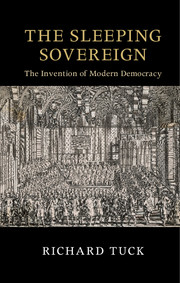2 - Grotius, Hobbes and Pufendorf
Published online by Cambridge University Press: 05 February 2016
Summary
Although one might have supposed that the new distinction between sovereign and government would be relatively uncontroversial, the opposite in fact proved to be the case. Throughout the seventeenth and eighteenth centuries the distinction was the focus of debate, with only the most radical writers being willing to align themselves with Bodin. What troubled Bodin's critics, it is clear, was primarily the implication of his views for the understanding of monarchy, and in particular his account of the Roman Republic and Principate: for in this account seventeenth-century readers found the political structures which had always been the greatest source of fascination and emulation for modern states interpreted disconcertingly as democracies. The one group of theorists that was able to use the distinction without raising this awkward question was the group of German constitutional writers studied by Franklin, who used it to analyse the German Empire along the lines Bodin had proposed for France, namely a monarchical sovereign and an aristocratic or even (for Bartholomew Keckerman) a democratic government. But outside Germany, to espouse the distinction was in general to put forward a radical political position.
This is strikingly illustrated by the fact that, as Jason Maloy has shown, the early English Independents or ‘Brownists’ seized on Bodin's ideas in this area to clarify their revolutionary ecclesiological ideas. Arguing against (mostly) Presbyterian critics who accused the Brownists of introducing democracy to church government, John Robinson, the principal Independent theorist, asserted (citing ‘Bodin of Commonw. book 1, chap. last’) that
we beleev, that the externall Church-government under Christ the onely mediatour, and monarch thereof is plainly aristocraticall, and to be administred by some certain choice men, although the state, which manie unskilfully confound with the government, be after a sort popular, and democraticall. By this it apperteyns to the people freely to vote in elections and judgments of the church: in respect of the other we make account, it behoves the Elders to govern the people even in their voting in just libertie, given by Christ whatsoever.
That is, the state in Bodinian terminology, or the sovereign, was a democracy in the sense that the congregation determined doctrine and elected the ministers, but the government was an aristocracy in the sense that it was a board of elders who made administrative decisions – though Robinson insisted that those decisions should be made ‘in the face of the congregation’ and not privately.
- Type
- Chapter
- Information
- The Sleeping SovereignThe Invention of Modern Democracy, pp. 63 - 120Publisher: Cambridge University PressPrint publication year: 2016

